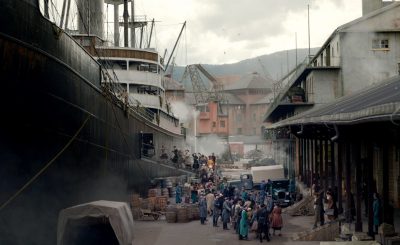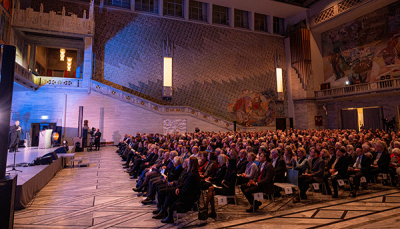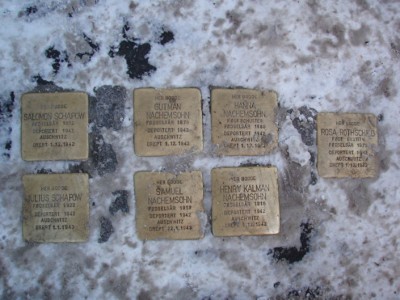Russia’s war on Ukraine brought new relevance to this weekend’s annual observance of a major tragedy during World War II in Norway. It marked 80 years since Norwegian police aided Nazi German occupiers in rounding up and sending 532 Norwegian Jews to death camps in Poland.

“On the way into a new, unknown darkness for the world, we’re looking back on another, bottomless black hole in humanity’s history,” wrote commentator Lars West Johnsen in newspaper Dagsavisen on Saturday, eight decades after the German ship D/S Donau sailed from Oslo with its “Cargo: Jews” (as written in harbour shipping records) on November 26, 1942. Only nine returned to Norway when the war ended three years later.
This year’s memorial attracted more than 700 people to the Oslo City Hall on Thursday the 24th, out of respect for the sabbath on the weekend. It was held amidst a new wave of fear and hatred in Europe, noted Johnsen, but also solidarity as European nations have banded together to support Ukraine. Vows were made to never again let tragedies like the war and the Holocaust occur, yet the danger remains.
“The lessons from World War II, which was followed by decades of progress and enlightenment, haven’t been enough to maintain peace, to protect nations and people from war and injustice,” wrote Johnsen, who also worries how anti-Semitism and prejudice also can rise again. Commentator Harald Stanghelle in newspaper Aftenposten shares similar concerns: “Hatred towards Jews has deep roots in Norway, a fact that defies the Norwegian self-image and therefore is denied so often.”
Stanghelle acknowledged in the paper’s November 26 edition how Aftenposten itself contributed to anti-Semitism during the 1930s. Members of Parliament strongly criticized Jews, farming organizations blamed them for the country’s economic crisis and even the Labour Party government at the time blocked entry to Jewish refugees fleeing the Nazis. Jews were viewed as foreign, they’d been denied residence in Norway in the first half of the 1800s and it’s now been documented how many Norwegians and, not least, Norwegian police aided Nazi occupiers in the deportation in 1942.

Norway only had around 2,100 Jewish residents in 1940, and many received help from “good Norwegians” to flee to Sweden after Nazi Germany’s invasion. A total of 738 Norwegian Jews were nonetheless killed in the Nazi’s concentration camps.
“It’s important to learn from history,” Prime Minister Jonas Gahr Støre said in his address at the memorial ceremony in Oslo on Thursday. While many fear history is repeating itself, Støre insisted that the ceremony itself “is a reminder that we must preserve our democratic society, and work to promote human rights, diversity and inclusion every single day.” Others, including historian Carl Emil Vogt, have noted that Russia’s war on Ukraine has reminded new generations that war and the atrocities it involves can happen again.
Støre said his own government, a coalition between Labour and Center (successor to the old farmers’ party of the 1930s), is worried by the degree of racist and other extreme views in today’s society. “We’re taking this seriously,” he said. “It’s our responsibility and duty to fend off anti-Semitism and racism. In our time’s uneasy Europe, with war and a new wave of refugees, it becomes even more important to keep this work hign on the agenda.”
The prime minister was challenged, however, by Rabbi Michael Melchior, who also spoke at the 80-years observance on Thursday. Oslo’s state-supported Holocaust Center (HL-senteret) reported how Melchior criticized Norwegian policy towards the local Jewish population and noted the need for Jewish school children to be free on Jewish holidays, for Kosher food to be available in prisons and for funding cuts at the Jewish senior center to be reversed. His remarks got a standing ovation, but Støre later responded that he couldn’t promise anything.
The head of the Holocaust Center, Guri Hjeltnes, also wants November 26 to become a national day of remembrance. Støre was positive to that, noting that it’s become a day “many mark, and it’s necessary.”
It’s only been in recent years that the plight of Norway’s Jewish population has received widespread attention. “Norwegians’ contribution to the Holocaust was silenced for far too long,” wrote Stanghelle, “also how Jews were treated before, during and after the war.” Journalist and author Bjørn Westlie played a major role in ending the silence with stories in newspaper Dagens Næringsliv (DN) in the 1990s about how Jewish businesses and property were confiscated with little if any compensation offered.

Since then there’s been a string of articles, books, film and other attention on the issue that’s bound to continue. Norway has also become the first country in Europe to complete its installation of memorials to individual Jewish residents killed during the Holocaust, in the form of small brass plaques placed outside their former homes.
A total of 757 plaques called snublestein have now been placed all over the country, marking the names, birth dates, deportation dates and death dates of Holocaust victims. The project began in Norway 12 years ago, outside what’s now the Jewish Museum on Calmeyers gate in Oslo, and serves as a constant reminder of the deportation to those walking by them.
Commentator Johnsen has written how he polishes one of the plaques laid down just outside his own home in Oslo’s Grünerløkka district, in honour of Salomon Tominsky. Tominsky’s wife and children managed to flee but Tominsky, age 51, was arrested at home, shipped out on the Donau and killed at Auschwitz a week later. Their downtown apartment was quickly turned over to the family of a Norwegian fighting for Nazi Germany on the Eastern Front.
NewsinEnglish.no/Nina Berglund

